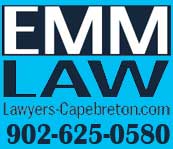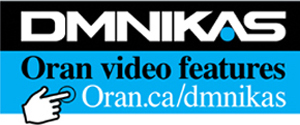May 12, 2021
-by April MacDonald
Wearing proper masks and getting vaccinated could end this pandemic.
That’s what some of the most leading scientists are saying – as well as our own Chad Munro of Halifax Biomedical.
However, the most recent cause for concern is with these variants, which will likely require people to get booster shots even after they have received the initial two doses of the vaccination. And that’s where the importance of the mask you wear on your face comes in.
Rewind to March 17th, 2020, we were neophytes learning that there was a coronavirus causing a global pandemic – a virus that we knew very little about.
Also at that time there was a call to action from the Canadian government to all medical device companies to start manufacturing PPE (personal protection equipment).
Halifax Biomedical, based out of Mabou, is in that exact business.
“We chose the mask,” said Chad Munro, professional engineer and chief executive officer of Halifax Biomedical Inc.
He said they knew there was a shortage and they quickly went to work on attempting to source material to manufacture masks for health care workers.
They spent quite a lot of time, effort, and money in their attempt to source quality material.
“We had business partners with people who knew the industry in Europe, China, as well as here in Canada,” said Munro.
He said that they were able to find supply right away and that there were opportunities to purchase masks in the first couple of weeks after the pandemic was declared.
They kept digging and found out when they dug deeper into the supply chain that they would consistently encounter errors in documentation, old certificates, irregularities, and poor quality.
“Basically, a lot of fraud,” said Munro.
He said that eventually they had to look at the supply chain and whether or not they could trust it.
Most of the masks just were not manufactured at a high quality and to combat this virus and protect frontline workers they would require the highest grade mask.
They decided that they could not work with manufacturers that they didn’t know.
They wanted to find a way to source and make the masks domestically – but sourcing material in Canada proved to be quite challenging.
“It was the most strange experience of my life, but we were so motivated to help that we didn’t want to give up,” said Munro.
“We wanted to solve the problem,” he added.
The company unfortunately suffered losses as companies they were working with defaulted or didn’t deliver on what was agreed.
“There’s not much legal recourse when dealing with internationally companies,” he explained.
Unfortunately, Halifax Biomedical lost quite a bit in legal fees in their attempts to do the necessary due diligence.
“But we just weren’t comfortable doing it any other way,” said Munro.
They decided on using the 3M mask and the N95, and spent months working directly with manufacturers. By May, they found they could buy quality products from the United States.
Halifax Biomedical wouldn’t just purchase and manufacture however, they would have to put their products through an extremely rigorous testing regime working with a lab out of Dalhousie University.
“Even certified products from the US would fail the test or prove to be counterfeit,” said Munro.
They eventually found a supplier that passed the test.
For the N95 mask they needed specific documentation requirements, certificates that were legitimate, batch numbers that matched the samples, etc.
When they received the product, they would cut circles in the mask and insert into a machine to test if particle sizes matched or exceeded filtration requirements.
“We would test pressure as well, the mask needs a good filter but you have to be able to breathe properly as well,” he explained.
They worked with the Health and Environments Research Centre [HERC] Laboratory at Dalhousie University. The HERC lab researches on aerosol science, toxicological impacts of airborne particles on human health, risk assessment of air quality on human health, and research and technology development on the implications of climate change for human health and society.
“They tested each mask we sent – and we sent many including cloth, nylon, combinations of both, surgical, double layered, you name it – and only two manufactures passed,’ said Munro.
“We tested everything in order to get a functional product and we borrowed a very advanced machine attached to a tube that connects to the mask to test how the mask fits and works on the face,” he explained.
They did an internal study with all of the masks: the cloth, double layered, surgical, 3M, and the N95.
“The cloth masks filtered out only five per cent, as did the double layered and the surgical masks,” said Munro.
The N95 was far superior filtering out above 95 per cent. They consistently filtered out closer to the 97 percent range.
“We really want to get this message out to the public to encourage people to wear a proper mask,” said Munro.
“I think a story about our efforts to bring in a better mask would be very timely given the new COVID variants,” he said.
“Surgical masks are not sufficient to protect the wearer from contracting COVID, people really need to be wearing properly fitted N95/FFP2 masks,” he explained.
“This is the mask that could end the pandemic,” said Munro.
He said that if someone is sick the mask helps to prevent them getting others sick but you wearing any mask does not protect you from breathing this deadly virus into your lungs when out in public.
Asking why everyone wasn’t told this right away, he said the reason why was due to the fact of supply and demand – governments wanted to ensure that health care workers had the proper PPE.
When COVID-19 was declared a global pandemic, personal protective equipment used to prevent disease transmission was in short supply. The CDC did not recommend the routine use of respirators mainly because N95 masks should be reserved for health care workers regularly exposed to the disease.
There simply weren’t enough masks to go around initially.
“That is no longer the case,” said Munro.
“We have also validated a third and fourth supply line, but since the vaccine has been announced the government demand has slowed down. We can actually import at a rate of two million masks per day if the demand warrants it,” he explained.
“We currently only have around 80,000 masks in inventory. We started with just under 100,000. So far, we have been focussed on just getting them into the local environment,” he added.
“We strongly believe that everyone should be wearing the N95 for getting their groceries, going to the hardware store or pharmacy, and that all essential workers should be wearing them to stay protected,” said Munro.
“I was a bit shocked at how poorly the cloth and nylon masks tested,” he added.
He said a major difference is the rim that presses against the face – if there is no seal then the air just circulates around the face.
The coronavirus is primarily spread via respiratory droplets from sneezes and coughs, so masks do decrease risk of infection if there is a seal and they are used properly.
“The vaccine is effective; but with these variants, boosters will be required in the future. Next year, we must still act as if this virus can get us sick even if vaccinated and especially if you have a compromised immune system,” he explained.
He said there are two choices: lock everyone in their homes (which proves challenging) or wear an effective mask in public.
“I encourage everyone to wear a better mask if you don’t want to inhale a deadly virus,” he closed.
Halifax Biomedical advertised where and how to get their mask in the April 28th issue of The Inverness Oran if you were looking at purchasing masks for your family and loved ones. Or contact them through Facebook or their website www.halifaxbiomedical.com.





